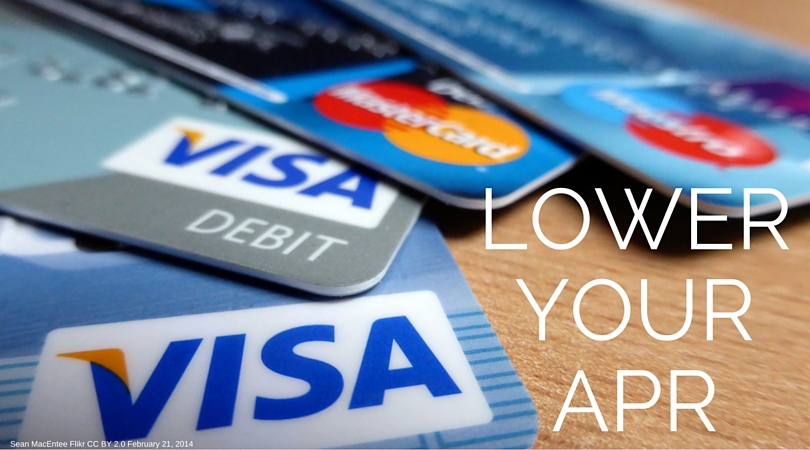Lowering your APR might be easier than you think
Many Americans are walking around with a balance on their credit card because of high interest rates, or annual percentage rate (APR) charges for unpaid balances. It's best to pay off your balance in full but if you don't or can't, a higher APR makes your debit grow faster. What most people don’t realize is this APR can be negotiated to a lower rate.
Deflate Your Rate: How to Lower Your Credit Card APR
Many Americans are walking around with a balance on their credit card because of high interest rates, or annual percentage rate (APR) charges for unpaid balances. It’s best to pay off your balance in full but if you don’t or can’t, a higher APR makes your debit grow faster. There are countless credit cards — all with different rewards options and varying APRs. While many cards have no to low introductory APRs, the average is about 18 percent.[1] With rates this high, consumers pay an average of $2,630 per year in interest.[2]
What most people don’t realize is this APR can be negotiated to a lower rate. CreditCards.com, an online tool for consumers to compare credit card offers, recently conducted a survey and found that 78 percent of customers who made a five minute call negotiated a lower APR.[3] This number is higher than was found in our own study from 2002, where 56 percent of consumers who called their credit card company were able to lower their APRs.[4]
We put this to the test. My coworker and I called our credit card companies to negotiate a lower APR. We used the same basic script, which is posted below. I spoke to a supervisor at Chase, who informed me that they are not currently negotiating APRs, and was unsuccessful in lowering my interest rate.
My coworker, who has Discover, called and had better success. He started out with 19 percent APR. When he called, he was offered a permanent APR of 16 percent, and even better, a yearlong promotion of 3.2 percent APR. He took this yearlong rate — much lower than his previous rate — and will call back one year from now to renegotiate before it jumps back up to 19 percent. As he put it, “I was surprised by how easy it was to lower my APR. I thought I was missing something — but no, it’s actually just really easy if you make the call.”
Regardless of the outcome, there’s no harm in calling to try to lower your APR. Most credit card companies are very competitive, and customers hold more power than they might think. While it is always best to pay off your credit card balance in full or as much as you can afford, a lower APR means you pay less interest. If you have more than one card, make your biggest payments on the cards with the lowest APRs. If you pay only the minimum payment, you are running on a debt treadmill — the bank wins, and you lose.

From our study, the following factors played a role in successfully negotiating APR:
- Length of time with a particular card (longer is better)
- Credit limit on that card (a higher limit is better)
- Unpaid balance-to-limit ratio on that card — how “maxed out” the cardholder is (a lower balance, making a lower ratio, is better)
- Unpaid balance-to-limit ratio on all cards (a lower balance is better)
- Number of times an individual missed or paid late on a loan or a card other than the one for which they were calling (fewer is better)
Here is a sample script you can use to try this out
“Do you have the authority to change my interest rate?” If the answer is no, simply ask, “May I speak to someone who can? Your supervisor, perhaps? Thank you!”
“Hi, my name is _____. I’ve been a good customer of (current credit card company) for (number of years), but my APR is too high. I have offers of (x) from (competing credit card company A), and (y) from (competing credit card company B).
I’ve had a good experience with you, but I’m considering switching. I would like to have my APR lowered. Can you can lower my interest rate?
Could you reduce the interest rate on my account to ____ percent?”
If they offer you just a point lower, but don’t get you to your target rate, say, “Can you do any better?” If it’s the best that they can do, move on to the next step [talking to a supervisor].
[1] Nerd Wallet, American Household Credit Debt Study, 2015.
[2] Ibid.
[3] CreditCards.com, Poll: Most who ask get late fees waived, rates reduced, March 2016.
[4] U.S. PIRG, Deflate Your Rate: How to Lower Your Credit Card APR, 2002.
[5] Lifehacker, Negotiate a Lower Credit Card APR with this Script, 2015.
Topics
Authors
Kathryn Lee
Find Out More

Bike helmets recalled: 140,000 and counting don’t meet safety standards; 13 separate recalls

New airline travel protections for consumers: refunds, transparent fees and more

U.S. food regulators allow most food additives, but could that change?
